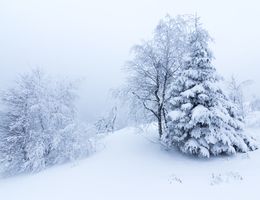Health library
Back to health libraryWinter storm safety tips

Winter storms can be dangerous if you're not prepared and informed.
Snowmen, snow angels and sledding are a few of the fun things winter storms can bring. But if you're not prepared for harsh weather, these storms can also cause problems with your home, health and safety.
A little preplanning can help ensure that you and your family weather winter's storms safely. The Federal Emergency Management Agency, the American Red Cross and other groups suggest the following steps to prepare for a safe winter.
Know about watches and warnings. The National Weather Service issues advisories when bad weather is coming. A winter storm watch means the conditions are right for a harsh storm and one could come your way. A winter storm warning means a winter storm is approaching or underway. A blizzard warning means you should expect three or more hours of heavy snow with winds or frequent gusts of at least 35 mph.
Get your car ready. Have a mechanic check the battery, antifreeze, windshield wipers, wiper fluid, ignition system, thermostat, lights, hazard lights, exhaust system, heater, brakes, defroster and oil. Install winter-grade tires with good tread, and keep the gas tank full.
Stock your winter car kit. Make sure each of your family's cars has a disaster kit. That way, anyone who gets stuck in the car during a storm will be able to stay comfortable and warm. This kit should include:
- Blankets or sleeping bags.
- Rain gear, mittens, socks, a wool cap and a warm change of clothes.
- Bottled water and high-energy snacks, such as nuts and canned fruit.
- A small shovel and a pocket knife, and basic tools such as pliers, a wrench and a screwdriver.
- Jumper cables.
- A bag of sand and tire chains or traction mats to help get a car moving in snow.
- A first aid kit with a supply of any needed medicines.
- A flashlight with extra batteries.
- A brightly colored cloth to tie to the antenna.
- Cards, games and puzzles.
- Matches in a waterproof container.
It's also a good idea to carry a cellphone with you when you drive.
Prepare your home. Make sure your house is insulated properly and doors and windows have the proper caulking and weather strips. Put in storm windows, or cover windows with plastic on the inside. If you have snow removal equipment, make sure it's serviced and in working order before storm season starts.
Stock your home disaster kit. Include water, food, clothing, flashlights, a radio, batteries, first aid kit, medicines and blankets. Also stock a bag of nonclumping cat litter, which can help with traction if you need to walk on snow. Check your smoke alarms and consider some safe emergency heating equipment such as portable heaters or extra fuel for your fireplace or woodstove.
Protect your pipes. Protect water pipes from freezing by wrapping them with insulation or layers of newspaper. Make sure you know how to shut off water valves, and keep your faucets open during a freeze just enough to let water drip a little.
Make a family plan. Discuss what to do if a storm hits, such as staying inside and avoiding travel. If a storm moves in while you're on the road, and it isn't safe or possible to keep driving, stay inside your car. Call for help if you have a cellphone. The Red Cross advises that you run the engine and heater for 10 minutes each hour, make sure the exhaust pipe is clear of snow to prevent carbon monoxide poisoning, and open a downwind window a bit for ventilation.
Designate an out-of-town family member you will all contact if you're separated when the storm hits and local phone service isn't working.
After the storm
Many of the deaths linked to winter storms happen after the storm passes because of exhaustion and heart attacks from overexertion. When you go outside after the storm, dress in several thin layers, stay well-hydrated, and be very careful walking on snowy or icy surfaces. You should also be careful not to overwork yourself shoveling snow or trying to move a stuck car since cold weather puts extra strain on your heart.
Older people especially are at risk for hypothermia, a dangerous drop in body temperature. If you have older neighbors, check on them to make sure they have heat, food and water.
Other hazards to watch for include house fires and asphyxiation from not using heating sources safely. Be very careful with fires and space heaters, and make sure your fire extinguishers are in working order.
Reviewed 10/6/2025
